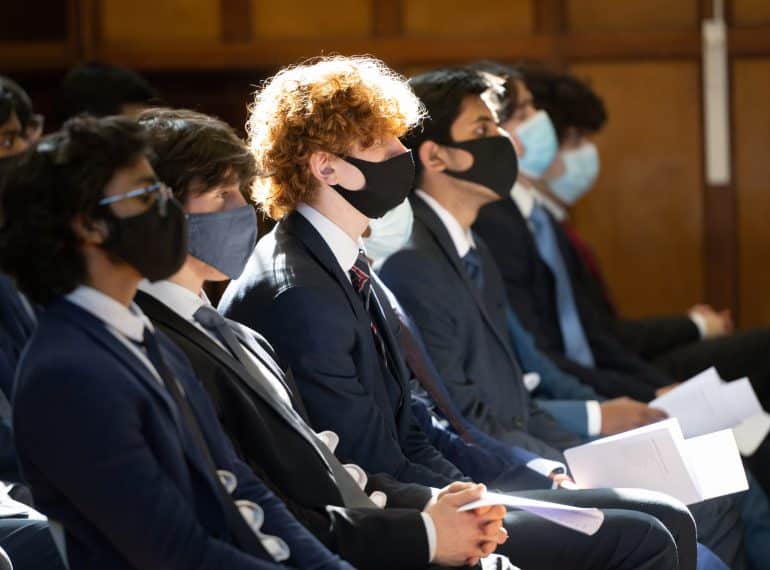
Senior Awards is always an important event in the QE calendar, and, although arrangements for this year’s celebration were different because of the coronavirus, the unique situation did not make the achievements of the prize-winners any less significant, said Headmaster Neil Enright.
 “Indeed, I would argue rather that it underlines them,” he told boys in the Main School Hall, adding: “We have gathered this afternoon, despite the challenges, because you are deserving of this recognition.”
“Indeed, I would argue rather that it underlines them,” he told boys in the Main School Hall, adding: “We have gathered this afternoon, despite the challenges, because you are deserving of this recognition.”
Senior Awards was split into two ceremonies to enable year group bubbles to be maintained, with boys from Years 10–11 coming to the hall first, followed later by the Sixth Form. Because of Covid restrictions, it was not possible to invite parents, the whole staff and the VIP guests who normally attend.
Collectively, the boys received more than 140 separate prizes. In addition to subject awards and prizes for extra-curricular involvements such as debating & public speaking and chess in each year group, there were awards for the boy making the best overall contribution to his year.
There was also a large number of special prizes for particular areas – The Queen’s College, Oxford, Extended Project Awards, for example – while in the Sixth Form, 12 prizes were given this year for commitment & service and nine for leadership & involvement.
The prizegiving was interspersed with a number of musical interludes, with the music being performed by the School’s senior musicians.
 In his address, the Headmaster told the audience of prize-winners and a small number of staff: “To be part of this select occasion is particular testament to your motivation, dedication and resilience over the past year. You have not just coped with the circumstances caused by the pandemic but have continued to thrive.”
In his address, the Headmaster told the audience of prize-winners and a small number of staff: “To be part of this select occasion is particular testament to your motivation, dedication and resilience over the past year. You have not just coped with the circumstances caused by the pandemic but have continued to thrive.”
He reflected on how much had changed since the last such ceremony at QE: “Looking back, it now seems utterly remarkable that our Senior Awards event in March of 2020 was in fact so normal, given the extraordinary situation that was about to unfold, and has continued to develop ever since. Both education and everyday life have been disrupted in a way not seen in our lifetimes.
“But, with increasing confidence, we can say we are now emerging, slowly but surely, from the crisis phase and, perhaps, into a new era of regeneration and renewal. We have done things as individuals, as a School, as a community, and as a country, that we probably couldn’t ever have imagined. If we can do that in an unprecedented crisis, then why not after it too?”
As with previous crises – he mentioned World War II and the Great Fire of London of 1666 following the plague outbreak of the previous year – the Covid-19 pandemic could become an “opportunity for progress”, he said, pointing to the argument of 20th-century Danish economist Ester Boserup in reference to population growth and agricultural production that “necessity is the mother of invention”.
 Citing the watchword of Captain Sir Tom Moore, “Tomorrow will be a brighter day,” Mr Enright continued: “Despite the undoubted challenges, today is already bright for you.
Citing the watchword of Captain Sir Tom Moore, “Tomorrow will be a brighter day,” Mr Enright continued: “Despite the undoubted challenges, today is already bright for you.
“I am excited to see what you can achieve with further growth. How you can be beacons among your peers and be shining lights in your communities, industries, and in society at large, in the years ahead.
“Congratulations on your awards. Enjoy them, celebrate them with your families, but also reflect on what you have put in to achieve them.
“With continuity in the character you have shown, I am confident that you will succeed in navigating the changing world and have every reason to be optimistic about your tomorrow.”
 In his traditional vote of thanks, the 2021 School Captain, Siddhant Kansal, of Year 12, told his fellow prize-winners: “Despite it being a smaller ceremony than it would usually be, the achievements that we are marking, your achievements, are as great, if not greater than they would be in a normal year because of the challenges that have been faced along the way in this most extraordinary of years.
In his traditional vote of thanks, the 2021 School Captain, Siddhant Kansal, of Year 12, told his fellow prize-winners: “Despite it being a smaller ceremony than it would usually be, the achievements that we are marking, your achievements, are as great, if not greater than they would be in a normal year because of the challenges that have been faced along the way in this most extraordinary of years.
“All of us know how good the competition out there is. So, without being smug, we can be rightfully and genuinely proud at being chosen to be here today.”
The musical contributions for the younger two year groups were from: Year 11 trumpeter Theo Mama-Kahn, performing William Boyce’s Trumpet Voluntary as a processional; pianist Harishan Thevalingham, of Year 10, with Rachmaninov’s Prelude in G Minor; Jao-Yong Tsai, of Year 11, playing Brahms’ Sonata in F minor Op.  120 No. 1 Movement 1, and Arjun Patel, of Year 10, playing Richard Kershaw’s Tango Till You Drop on the saxophone as a recessional.
120 No. 1 Movement 1, and Arjun Patel, of Year 10, playing Richard Kershaw’s Tango Till You Drop on the saxophone as a recessional.
For the Sixth Form awards, the processional was Handel’s Music for the Royal Fireworks, performed by final-year saxophonist Khai Tran, who also played the recessional, Czardas by Vittorio Monti. Year 12 cellist Raphael Herberg played Popper’s Tarantella, while Conor Parker-Delves, of Year 12, performed Prélude et Saltarelle by Robert Planel on the saxophone. QE’s piano teacher, Tadashi Imai, was the accompanist.

 After the live event was cancelled last July because of the pandemic (with an online version in its stead), the Junior Awards Ceremony went ahead in person this year, but in reduced format, without the usual audience of parents, VIP guests and the whole QE staff.
After the live event was cancelled last July because of the pandemic (with an online version in its stead), the Junior Awards Ceremony went ahead in person this year, but in reduced format, without the usual audience of parents, VIP guests and the whole QE staff. In total, 57 boys from the total of around 570 boys in Years 7–9 received prizes in the end-of-year ceremony.
In total, 57 boys from the total of around 570 boys in Years 7–9 received prizes in the end-of-year ceremony.

 “Indeed, I would argue rather that it underlines them,” he told boys in the Main School Hall, adding: “We have gathered this afternoon, despite the challenges, because you are deserving of this recognition.”
“Indeed, I would argue rather that it underlines them,” he told boys in the Main School Hall, adding: “We have gathered this afternoon, despite the challenges, because you are deserving of this recognition.” In his address, the Headmaster told the audience of prize-winners and a small number of staff: “To be part of this select occasion is particular testament to your motivation, dedication and resilience over the past year. You have not just coped with the circumstances caused by the pandemic but have continued to thrive.”
In his address, the Headmaster told the audience of prize-winners and a small number of staff: “To be part of this select occasion is particular testament to your motivation, dedication and resilience over the past year. You have not just coped with the circumstances caused by the pandemic but have continued to thrive.” Citing the watchword of Captain Sir Tom Moore, “Tomorrow will be a brighter day,” Mr Enright continued: “Despite the undoubted challenges, today is already bright for
Citing the watchword of Captain Sir Tom Moore, “Tomorrow will be a brighter day,” Mr Enright continued: “Despite the undoubted challenges, today is already bright for  In his traditional vote of thanks, the 2021 School Captain, Siddhant Kansal, of Year 12, told his fellow prize-winners: “Despite it being a smaller ceremony than it would usually be, the achievements that we are marking, your achievements, are as great, if not greater than they would be in a normal year because of the challenges that have been faced along the way in this most extraordinary of years.
In his traditional vote of thanks, the 2021 School Captain, Siddhant Kansal, of Year 12, told his fellow prize-winners: “Despite it being a smaller ceremony than it would usually be, the achievements that we are marking, your achievements, are as great, if not greater than they would be in a normal year because of the challenges that have been faced along the way in this most extraordinary of years. 120 No. 1 Movement 1, and Arjun Patel, of Year 10, playing Richard Kershaw’s Tango Till You Drop on the saxophone as a recessional.
120 No. 1 Movement 1, and Arjun Patel, of Year 10, playing Richard Kershaw’s Tango Till You Drop on the saxophone as a recessional.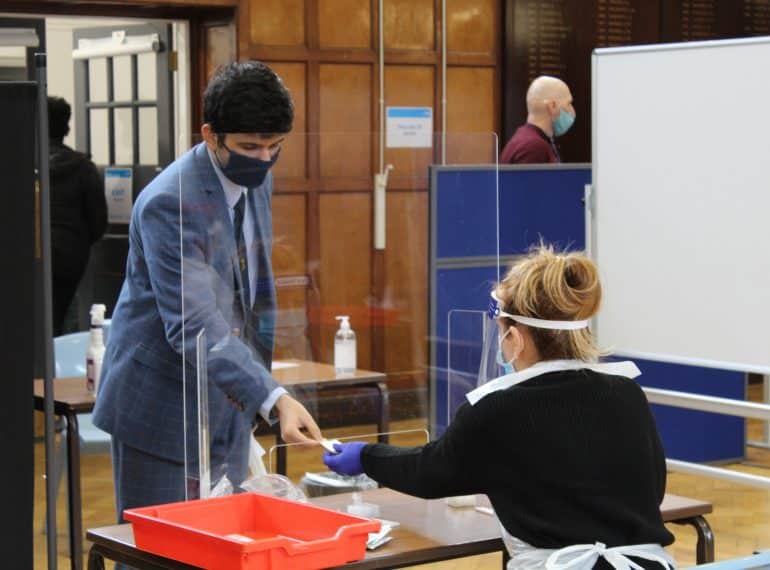
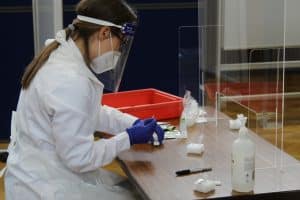 Years 12 and 13 were the first at QE to benefit from the asymptomatic testing programme that is clearing the way for classroom learning to start for all year groups on Thursday.
Years 12 and 13 were the first at QE to benefit from the asymptomatic testing programme that is clearing the way for classroom learning to start for all year groups on Thursday. “Although the testing is not compulsory, I am most encouraged to see that the participation rate is very high indeed, which will certainly aid the effectiveness of the programme in protecting all students and staff.”
“Although the testing is not compulsory, I am most encouraged to see that the participation rate is very high indeed, which will certainly aid the effectiveness of the programme in protecting all students and staff.”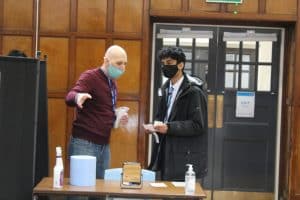 The group of volunteers involved in the programme spans the Elizabethan community, including parents, former members of staff and other friends of the School.
The group of volunteers involved in the programme spans the Elizabethan community, including parents, former members of staff and other friends of the School.
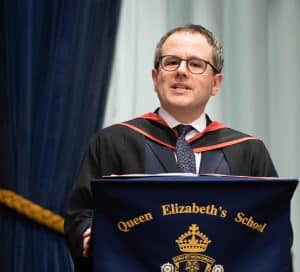 Headmaster Neil Enright said: “Theirs is a truly stellar achievement, achieved in the face of considerable uncertainty and additional challenge. I congratulate these 39 pupils on their hard work and application and I salute my colleagues who have done so much to make possible their success.
Headmaster Neil Enright said: “Theirs is a truly stellar achievement, achieved in the face of considerable uncertainty and additional challenge. I congratulate these 39 pupils on their hard work and application and I salute my colleagues who have done so much to make possible their success.
 The 32-page strategic vision plan redefines the School’s existing mission to produce young men who are ‘confident, able and responsible’ to ensure that pupils are equipped with all the attributes they need to thrive and lead in the fast-changing, and sometimes unpredictable, world of the 2020s.
The 32-page strategic vision plan redefines the School’s existing mission to produce young men who are ‘confident, able and responsible’ to ensure that pupils are equipped with all the attributes they need to thrive and lead in the fast-changing, and sometimes unpredictable, world of the 2020s. “To maintain and further amplify such success, we must continue to move forward. At the heart of the ambitious vision in the new plan is a fresh consideration of what it means to be an Elizabethan, looking at the combination of traditional qualities and new skills that our leavers will need to flourish in a global environment characterised by both crisis and opportunity. Our answer to that includes kindness, resilience, inclusivity and a commitment to the greater good of society, alongside attributes such as intellectual poise and broad, analytical thinking.”
“To maintain and further amplify such success, we must continue to move forward. At the heart of the ambitious vision in the new plan is a fresh consideration of what it means to be an Elizabethan, looking at the combination of traditional qualities and new skills that our leavers will need to flourish in a global environment characterised by both crisis and opportunity. Our answer to that includes kindness, resilience, inclusivity and a commitment to the greater good of society, alongside attributes such as intellectual poise and broad, analytical thinking.” The
The
 “I would say that our academic performance, combined with our superlative extra-curricular activities, our careful pastoral support and our commitment to ensuring Elizabethans go on to make significant contributions to wider society, mean that QE is not only remarkably consistent, but consistently remarkable, too.”
“I would say that our academic performance, combined with our superlative extra-curricular activities, our careful pastoral support and our commitment to ensuring Elizabethans go on to make significant contributions to wider society, mean that QE is not only remarkably consistent, but consistently remarkable, too.”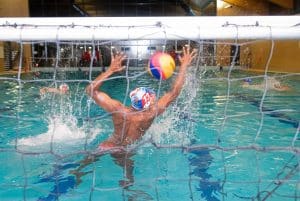 Mr Enright added: “We have continued to flex to the ever-changing coronavirus situation this term, ensuring that the academic progress of our pupils, their pastoral support and enrichment are maintained. Our established eQE remote learning platform has served us well, particularly as we have integrated it with Microsoft Teams and deployed other specialised online technologies to meet specific needs, such as SchoolCloud’s Parents Evening Video Appointments.”
Mr Enright added: “We have continued to flex to the ever-changing coronavirus situation this term, ensuring that the academic progress of our pupils, their pastoral support and enrichment are maintained. Our established eQE remote learning platform has served us well, particularly as we have integrated it with Microsoft Teams and deployed other specialised online technologies to meet specific needs, such as SchoolCloud’s Parents Evening Video Appointments.”